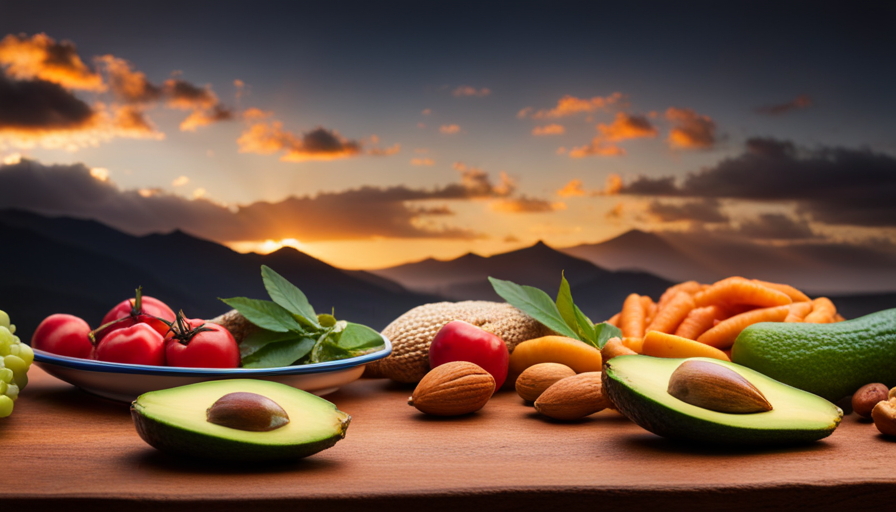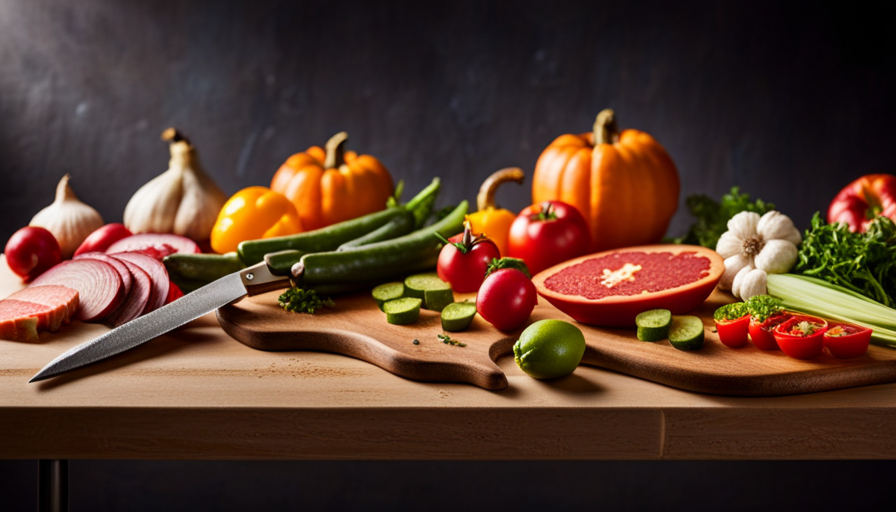Are you a raw food vegetarian who misses the tasty fats enjoyed by those on other diets? Don’t worry – increasing your fat intake within a raw food diet is not only possible, but also delicious!
Contrary to popular belief, a raw food diet doesn’t have to be all about fruits and veggies. In fact, incorporating healthy fats into your meals can provide numerous benefits for your overall health and well-being. From creamy avocados to crunchy nuts and seeds, there are plenty of options to choose from. And let’s not forget about the goodness of coconut products, cold-pressed oils, olives, cacao, and flaxseeds.
With a little creativity and some simple techniques, you can easily boost your fat intake while still sticking to your raw food principles. So get ready to indulge in some nourishing and satisfying dishes that will leave you feeling energized and satisfied.
Key Takeaways
- Incorporate avocados into your raw food vegetarian diet to increase healthy fats and reduce bad cholesterol levels. Avocados are nutrient powerhouses packed with vitamins and fiber.
- Include nuts and seeds like almonds, walnuts, flaxseeds, and chia seeds in your meals for their high content of omega-3 fatty acids, which are important for brain health and reducing inflammation.
- Utilize coconut products like coconut oil and coconut milk, which provide quick energy and have antimicrobial and antiviral properties. Coconut oil contains lauric acid, which has antibacterial and antiviral properties.
- Experiment with different cold-pressed oils such as avocado oil, flaxseed oil, and hemp oil to enhance the flavor and nutritional value of your meals. These oils are rich in essential fatty acids and offer unique flavors.
Understanding the Importance of Healthy Fats in a Raw Food Diet
Healthy fats are like the fuel that keeps our bodies running smoothly on a raw food diet. Understanding the role of healthy fats in a plant-based diet is crucial for raw food vegetarians. While some people may be wary of fats, it’s important to know that not all fats are created equal. Healthy fats are essential for our overall health and well-being.
When it comes to raw food vegetarianism, there are plenty of options for incorporating healthy fats into your diet. One great source of healthy fats is avocados. Avocados are not only delicious, but they’re also packed with monounsaturated fats, which can help reduce bad cholesterol levels.
Another excellent source of healthy fats for raw food vegetarians is nuts and seeds. Almonds, walnuts, flaxseeds, and chia seeds are all rich in omega-3 fatty acids, which are important for brain health and reducing inflammation in the body.
Coconut oil is another fantastic option for increasing your fat intake on a raw food vegetarian diet. It contains medium-chain triglycerides (MCTs), which are easily digested and provide a quick source of energy. Additionally, coconut oil has been shown to have antimicrobial and antiviral properties.
Understanding the role of healthy fats in a raw food vegetarian diet is essential for maintaining optimal health. Incorporating sources like avocados, nuts and seeds, and coconut oil can provide the necessary fats to keep your body running smoothly and efficiently.
Incorporating Avocados for a Creamy and Nutritious Boost
Indulge your taste buds with the rich and velvety texture of avocados, a luscious addition to your plant-based diet. Avocados are not only delicious, but they also offer numerous health benefits. Here are some reasons why you should incorporate avocados into your raw food vegetarian lifestyle:
-
Nutrient powerhouse: Avocados are packed with essential nutrients like vitamins C, E, and K, as well as potassium and fiber. These nutrients support overall health and can help prevent chronic diseases.
-
Healthy fats: Avocados are a great source of monounsaturated fats, which are heart-healthy and can help lower bad cholesterol levels. These fats also aid in the absorption of fat-soluble vitamins and promote satiety, keeping you feeling full and satisfied.
-
Versatile ingredient: Avocados can be used in a variety of raw food recipes to add a creamy and satisfying texture. Try using mashed avocados as a spread on raw crackers or as a base for salad dressings. You can also blend avocados into smoothies for an extra dose of creaminess.
Incorporating avocados into your raw food vegetarian diet is a simple and delicious way to increase your fat intake. Experiment with different avocado recipes and enjoy the benefits of this nutritious fruit.
Harnessing the Power of Nuts and Seeds
Get ready to amplify your plant-based diet by incorporating the powerhouse of nuts and seeds, a surefire way to add a delightful crunch and boost of nutrition to your meals.
Nuts and seeds are not only packed with healthy fats, but they’re also rich in protein, fiber, vitamins, and minerals. By harnessing the nutty flavors and exploring seed varieties, you can easily increase your fat intake while enjoying a wide array of flavors and textures.
When it comes to nuts, options like almonds, walnuts, and cashews are excellent choices. They’re not only high in monounsaturated fats, but they also provide essential nutrients like magnesium, vitamin E, and omega-3 fatty acids. These nuts can be eaten as a snack, sprinkled onto salads, or blended into creamy sauces and dressings.
Seeds, on the other hand, offer a different set of nutritional benefits. Flaxseeds, chia seeds, and hemp seeds are rich in omega-3 fatty acids, fiber, and protein. They can be incorporated into smoothies, used as a topping for oatmeal or yogurt, or added to baked goods for an extra nutritional boost.
To maximize the nutritional benefits, it’s important to consume nuts and seeds in their raw and unsalted form. This ensures that you’re getting the most out of their natural goodness without any added oils or sodium.
So go ahead and start incorporating nuts and seeds into your meals to increase your fat intake and enjoy the nutty flavors and variety they bring to your vegetarian diet.
Adding Coconut Products for Satiety and Flavor
Coconut products are a versatile addition to your plant-based meals, offering both satiety and a burst of flavor. Did you know that coconut oil contains lauric acid, which has been shown to have antibacterial and antiviral properties?
Adding coconut products to your diet is a great way to increase your fat intake on a raw food vegetarian diet. Coconut oil can be used in a variety of recipes to add a rich and creamy texture. It’s a great substitute for butter or oil in baking and can also be used as a spread or in dressings and sauces.
Coconut milk, another popular coconut product, is a great addition to smoothies, soups, and curries. It adds a creamy texture and a hint of sweetness. In addition to its delicious flavor, coconut oil and milk have been shown to have numerous health benefits. They are rich in medium-chain triglycerides, which are easily digested and can provide a quick source of energy.
Coconut oil has also been found to increase metabolism and promote weight loss. So, if you’re looking to increase your fat intake on a raw food vegetarian diet, consider incorporating coconut products like coconut oil and coconut milk into your meals. Not only will they add flavor and satiety, but they also offer a range of health benefits.
Exploring the Benefits of Cold-Pressed Oils
Discover the remarkable advantages of incorporating cold-pressed oils into your meals, and let their nourishing properties elevate your culinary experience. When it comes to increasing your fat intake on a raw food vegetarian diet, cold-pressed oils offer a delicious and healthy alternative. Not only do they provide essential fatty acids, but they also bring a unique flavor and texture to your dishes.
Cold-pressed oils are made without the use of heat or chemicals, preserving the natural nutrients and flavors of the oils. This makes them a great choice for those seeking to maintain a raw food diet. Some popular cold-pressed oil alternatives include avocado oil, flaxseed oil, and hemp oil. These oils are rich in omega-3 fatty acids, which are vital for brain health and reducing inflammation in the body.
Incorporating cold-pressed oils into your meals is easy. You can drizzle them over salads, use them as a dressing base, or add them to smoothies for a creamy texture. They also work well in raw desserts, giving them a luscious and indulgent taste. Remember to store your cold-pressed oils in a cool, dark place to maintain their freshness and maximize their benefits.
By incorporating cold-pressed oils into your raw food vegetarian diet, you can enjoy the benefits of essential fatty acids while enhancing the flavor and texture of your meals. So go ahead and experiment with different cold-pressed oils to take your culinary experience to the next level.
Embracing Nut Butters for a Delicious and Nutrient-Dense Option
Incorporating nut butters into your meals is a delectable way to add a nutrient-dense option to your culinary repertoire. Not only are they delicious, but they also offer a wide range of health benefits. Here are three reasons why you should consider incorporating nut butter alternatives into your diet:
-
Nut butter alternatives: While peanut butter may be the most common nut butter, there are many other options available. Almond butter, cashew butter, and sunflower seed butter are just a few examples. Each variety offers a unique flavor profile and nutrient composition, allowing you to experiment and find your favorite.
-
Nutrient-dense: Nut butters are packed with essential nutrients. They’re a great source of healthy fats, protein, and fiber. These nutrients help keep you feeling full and satisfied, making them a perfect addition to a raw food vegetarian diet.
-
Incorporating seeds in recipes: Nut butters can also be made from a combination of nuts and seeds. This adds an extra nutritional boost to your meals. Chia seeds, flax seeds, and hemp seeds are all excellent options to incorporate into your homemade nut butters. They provide omega-3 fatty acids, antioxidants, and additional fiber.
Incorporating nut butter alternatives and incorporating seeds in recipes can help increase your fat intake while following a raw food vegetarian lifestyle. So go ahead and enjoy the delicious taste and health benefits that nut butters have to offer!
Incorporating Olives and Olive Oil for a Mediterranean Twist
Olive oil and olives are essential components of the Mediterranean diet, known for their ability to promote heart health and reduce the risk of chronic diseases. If you’re looking to increase your fat intake in a raw food vegetarian diet, incorporating olives and olive oil is a great way to add flavor and healthy fats to your meals.
When it comes to the Mediterranean diet, olives are a staple. Not only are they delicious, but they are also packed with monounsaturated fats, which have been shown to reduce bad cholesterol levels and lower the risk of heart disease. You can enjoy olives on their own as a snack or incorporate them into various raw food recipes, like salads, wraps, or even homemade olive tapenade.
Additionally, olive oil is a key ingredient in Mediterranean cuisine and can easily be incorporated into your raw food diet. It’s important to choose extra virgin olive oil, as it is less processed and contains higher levels of antioxidants. Drizzle it over salads, use it as a dip for raw vegetables, or add it to your favorite raw food recipes for an extra burst of flavor and healthy fats.
To give you some inspiration, here’s a table showcasing some delicious ways to incorporate olives and olive oil into your raw food meals:
| Dish | Description | Recipe Link |
|---|---|---|
| Greek Salad | A refreshing mix of tomatoes, cucumbers, feta cheese, and olives | Greek Salad Recipe |
| Olive Tapenade | A flavorful spread made with olives, capers, garlic, and herbs | Olive Tapenade Recipe |
| Zucchini Noodles | Raw zucchini noodles tossed with olive oil, cherry tomatoes, and olives | Zucchini Noodles Recipe |
| Olive Oil Dressing | A simple dressing made with olive oil, lemon juice, and herbs | Olive Oil Dressing Recipe |
Incorporating olives and olive oil into your raw food diet not only adds a Mediterranean twist to your meals but also provides you with essential healthy fats. So go ahead and explore these delicious alternatives to increase your fat intake while enjoying the benefits of a raw food vegetarian lifestyle.
Experimenting with Raw Cacao and Chocolate for a Decadent Treat
Indulge yourself in the rich and decadent world of raw cacao and chocolate, and treat your taste buds to a delightful and guilt-free experience. Raw cacao, the purest form of chocolate, is packed with essential nutrients and health benefits.
Not only does it satisfy your sweet cravings, but it also adds a boost of healthy fats to your raw food vegetarian diet. Raw cacao can be used in a variety of delicious recipes.
You can make raw cacao smoothies by blending it with ripe bananas, almond milk, and a touch of honey for sweetness. Another option is to create decadent raw cacao truffles using dates, nuts, and a sprinkle of sea salt. These treats are not only delicious but also provide you with essential nutrients like magnesium, iron, and antioxidants.
When it comes to the health benefits, raw cacao is a nutritional powerhouse. It has been linked to improved heart health, lower blood pressure, and reduced inflammation. The antioxidants in raw cacao can also help protect your cells from damage caused by free radicals.
So go ahead and experiment with raw cacao and chocolate in your raw food vegetarian diet. Enjoy the delicious flavors while reaping the numerous health benefits it has to offer. Your taste buds and your body will thank you!
Discovering the Health Benefits of Flaxseeds and Chia Seeds
Discover the incredible health benefits waiting for you when you explore the world of flaxseeds and chia seeds. These tiny powerhouses are packed with nutrients that can enhance your overall well-being.
Here are some of the emotional benefits of incorporating flaxseeds and chia seeds into your diet:
-
Boosted mood: Flaxseeds and chia seeds contain omega-3 fatty acids, which’ve been linked to improved mood and reduced symptoms of depression. Adding these seeds to your meals can help you feel happier and more balanced.
-
Increased energy: Flaxseeds and chia seeds’re rich in fiber, protein, and healthy fats, which provide a sustained release of energy throughout the day. Say goodbye to energy crashes and hello to lasting vitality.
-
Enhanced digestion: The fiber content in flaxseeds and chia seeds promotes healthy digestion, preventing constipation and supporting regular bowel movements. A healthy gut’s essential for both physical and mental well-being.
In addition to these emotional benefits, flaxseeds and chia seeds offer numerous physical health advantages. They’re excellent sources of omega-3 fatty acids, which can improve heart health and reduce inflammation. These seeds’re also high in antioxidants, which help protect against cell damage and chronic diseases.
Looking to incorporate flaxseeds into your baking recipes? Simply grind them into a fine powder and substitute them for a portion of the flour in your recipes. This’ll not only increase the nutrient content but also add a pleasant nutty flavor. So go ahead and explore the world of flaxseeds and chia seeds to reap their incredible health benefits.
Creating Delicious and Filling Smoothies with Nut Milk and Nut Creams
Whip up a creamy and satisfying smoothie using nut milk and nut creams, and transport your taste buds to a blissful oasis of flavor and indulgence. If you’re following a raw food vegetarian diet and looking to increase your fat intake, these delicious and filling smoothies are a great option.
Not only are they packed with nutrients, but they also provide a delicious and convenient way to incorporate superfoods into your daily routine.
When it comes to nut milk, there are plenty of options available for those who’re looking for nut-free alternatives. Coconut milk is a popular choice, as it adds a rich and creamy texture to your smoothies. You can also try using oat milk, hemp milk, or rice milk, which are all free from nuts and provide a great base for your smoothie.
To make your smoothie even creamier, you can add nut creams such as almond butter or cashew butter. These nut creams not only add a delicious flavor but also increase the fat content of your smoothie. They’re also a great source of protein and healthy fats, making them an excellent addition to your raw food vegetarian diet.
Incorporating superfoods into your smoothie is another way to boost the nutritional value. Chia seeds and flaxseeds are two superfoods that’re high in healthy fats and can easily be added to your smoothie. They provide a great source of omega-3 fatty acids, which’re essential for brain health and overall well-being.
So, if you’re looking to increase your fat intake on a raw food vegetarian diet, give these creamy and delicious smoothies a try. With nut milk, nut creams, and superfoods, you can create a satisfying and nutrient-packed beverage that’ll keep you fueled and satisfied throughout the day.
Frequently Asked Questions
Can I increase my fat intake on a raw food vegetarian diet without consuming avocados?
To increase your fat intake on a raw food vegetarian diet without consuming avocados, there are alternative fat sources you can incorporate. Nuts and seeds, such as almonds, walnuts, and chia seeds, are rich in healthy fats. They provide essential nutrients and can be added to smoothies, salads, or used as toppings.
Additionally, coconut oil is another option, as it contains medium-chain triglycerides that are easily digestible and can be used for cooking or as a spread. Remember, avocados have numerous benefits, so consider including them in your diet if possible.
Are there any alternatives to nuts and seeds for increasing fat intake on a raw food vegetarian diet?
Looking for alternative fat sources on a raw food vegetarian diet? Good news! There are plenty of options besides nuts and seeds. Consider adding coconut oil, olives, and flaxseeds to your meals.
Coconut oil is rich in healthy fats and can be used for cooking or added to smoothies.
Olives are a great source of monounsaturated fats and can be included in salads or as a snack.
Flaxseeds are packed with omega-3 fatty acids and can be sprinkled onto yogurt or blended into smoothies.
Get creative with these alternative fat sources and enjoy your raw food meals!
Can I substitute coconut products with other ingredients to achieve the same satiety and flavor?
To maintain flavor on a raw food vegetarian diet, you can substitute coconut products with other ingredients. Avocado is an excellent substitute as it’s rich in healthy fats and provides a creamy texture. You can also try using nuts like almonds or cashews, which can be blended into sauces or dressings. Additionally, tahini, a paste made from sesame seeds, can add a nutty flavor and richness to your dishes.
These substitutes will help you achieve satiety and enhance the taste of your meals.
What are the health benefits of incorporating cold-pressed oils into a raw food vegetarian diet?
Incorporating cold-pressed oils into your raw food vegetarian diet can provide numerous health benefits. These oils are extracted from seeds and nuts using a method that preserves their natural nutrients. They’re rich in essential fatty acids, such as omega-3 and omega-6, which are vital for brain function, reducing inflammation, and supporting heart health.
Additionally, cold-pressed oils contain antioxidants that can help protect against oxidative stress and promote overall well-being.
Are there any other options besides nut butters to add delicious and nutrient-dense fats to a raw food vegetarian diet?
To add delicious and nutrient-dense fats to your raw food vegetarian diet, consider alternative fats like avocados, coconut oil, and olives. Avocados are a great source of healthy monounsaturated fats, while coconut oil provides medium-chain triglycerides. Olives and their oil are rich in heart-healthy monounsaturated fats.
Additionally, high-fat fruits like durian and coconuts can be incorporated into your diet. These options not only increase your fat intake but also provide essential nutrients for a well-rounded raw food vegetarian diet.
Can Increasing Fat Intake Help with Resetting Metabolism on a Raw Food Diet?
Many believe they can reset metabolism with raw food by increasing fat intake. However, scientific evidence on this topic is limited. While some fats can be beneficial, it’s important to maintain a balanced diet and seek guidance from a nutritionist before drastically changing eating habits.
Conclusion
In conclusion, increasing your fat intake in a raw food vegetarian diet is essential for overall health and well-being. By incorporating nutrient-rich foods like avocados, nuts, seeds, coconut products, cold-pressed oils, olives, raw cacao, flaxseeds, and chia seeds, you can easily boost your fat intake while enjoying delicious and filling meals.
These foods provide essential fatty acids, vitamins, minerals, and antioxidants that support brain function, heart health, and digestion. So don’t be afraid to indulge in these nourishing fats and experience the incredible benefits they have to offer. Trust me, your body will thank you with a burst of energy and a radiant glow!










